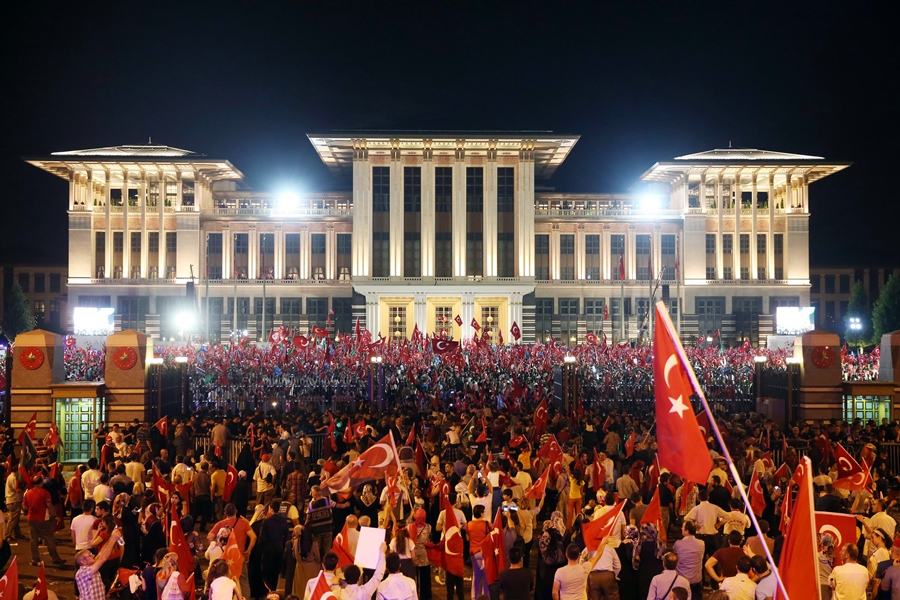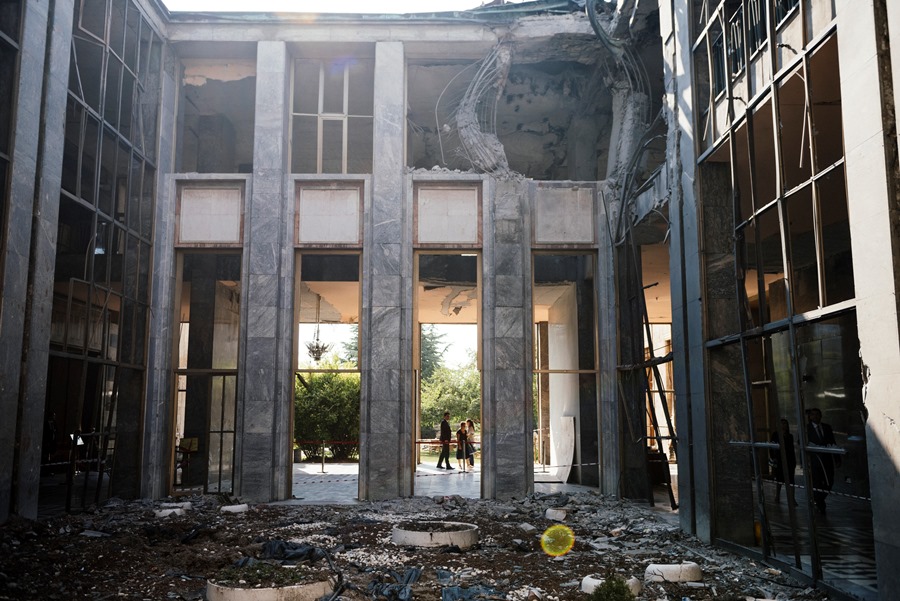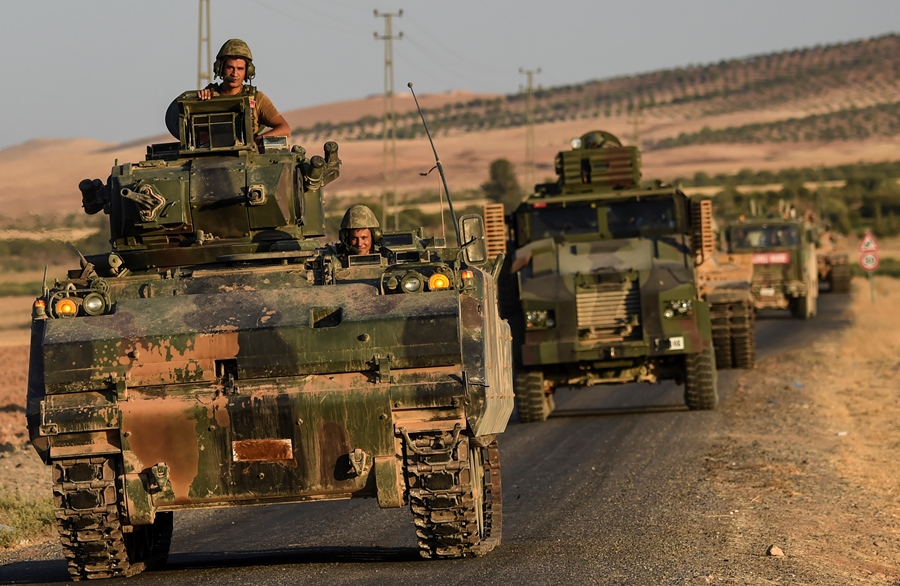On 15 July 2016, tanks rolled down the streets of İstanbul to block traffic flowing from Asia to Europe over the Bosporus Bridge. The event, which took place during the Friday rush hour, was quite odd. Having witnessed an upsurge in PKK and ISIS violence in recent months, many people reasoned that the authorities had probably been tipped off about an impending terror attack and were taking precautions. Others argued on social media that an aircraft could have been hijacked by terrorists. Hardly anyone thought, let alone said out loud, that a coup d’etat was underway. When the troops stationed on the bridge started telling by-passers to go home and military jets began flying low over the Turkish capital Ankara, it became clear to everyone that a group of soldiers were attempting to overthrow the democratically elected government.
According to initially available information, many, if not all, coup plotters had been identified by the Turkish intelligence as members of FETÖ, a Pennsylvania-based terrorist organization led by Fetullah Gülen. Their names were shared with the Military Chief of Staff, whose office intended to expel the individuals in question from the military in the upcoming annual Supreme Military Council (YAŞ) meeting in August 2016. Based on the same information, President Recep Tayyip Erdoğan appeared on national television to identify the perpetrators as a group of Gülenist soldiers who were acting outside the chain of command and urged the people to take to the streets and resist the power grab. Prime Minister Binali Yıldırım, cabinet ministers, opposition leaders and military commanders made similar statements to defy the would-be junta, express their support for the elected government and pledged to defend Turkish democracy. By midnight, pro-coup soldiers had stormed TRT, the public broadcaster, to hold an anchorwoman at gunpoint and force her to read a statement on air purporting to indicate that the Armed Forces had overthrown the government, suspended the Constitution and imposed martial law. The coup plotters in fact represented only a small minority within NATO’s second largest army, however they would proceed to seize control of airports, target strategic government buildings and attempt to assassinate the president.
The nation’s ability to stop a military coup established that Turkish democracy has significantly matured and been consolidated since President Erdoğan and AK Party came to power in 2002
Ahead of the coup attempt, known members of Fetullah Gülen’s terrorist organization had publicly argued that the military could seize power with no resistance. They failed to calculate that overthrowing an elected government, in reality, is no walk in the park. Hearing the president’s call, hundreds of thousands of ordinary citizens risked their lives to defeat the coup plotters through peaceful resistance for the first time in the nation’s history. The Turkish people’s refusal to concede power to terrorists in uniform not only marked a watershed moment in Turkey’s political history but also inspired freedom-loving nations around the world. Thanks to the sacrifice of millions, our country continues its progress uninterrupted.
Why July 15 Matters
Although the coup attempt was thwarted, its perpetrators inflicted considerable damage before they were arrested. Within a few short hours 241 innocent people, including women and children, lost their lives at the hands of the coup plotters. Thousands survived the assault with injuries. Gülen’s undercover operatives within the military didn’t just target Turkish citizens: The coup attempt also sought to drive a wedge between the Armed Forces, one of the most trusted institutions in Turkey, and the nation by casting doubt on the military’s commitment to democracy. But the Turkish people passed this painful test with flying colors.
 Turkish people gathered in front of the Presidential Complex, where President Erdoğan declared the end of the 25-day long democracy watch, on August 10, 2016. | AFP PHOTO / TURKEY’S PRESIDENTIAL PRESS SERVICE
Turkish people gathered in front of the Presidential Complex, where President Erdoğan declared the end of the 25-day long democracy watch, on August 10, 2016. | AFP PHOTO / TURKEY’S PRESIDENTIAL PRESS SERVICE
First and foremost, the nation’s ability to stop a military coup established that Turkish democracy has significantly matured and been consolidated since President Erdoğan and AK Party came to power in 2002. Although the country became a multi-party democracy some sixty-six years ago, the military served as a self-appointed guardian for decades. To be clear, coup plotters had maintained some level of popularity among the people and their representatives over the years. In 1960, when the Democratic Party (DP) was ousted from power and several DP leader including Prime Minister Adnan Menderes were executed after a show trial, some citizens considered military interventions in the political process as a necessary evil. Eleven years later, the Armed Forces again forced an elected government to step down by issuing a memorandum and threatening a coup. In 1980, the military commanders took matters into their hands yet again, to engage in systematic torture and human rights abuses, which were swept under the rug by those that tried to justify the coup with reference to peace, order and stability –a view typically prevalent over democratic credentials and pluralism during the Cold War. However, the military continued to interfere in civilian politics even after the Cold War had ended.
Citing concerns over secularism, military commanders in 1997 urged the government to step down or suffer the consequences – which led to the coalition government’s dissolution and a ruling by the Constitutional Court to outlaw the Welfare Party (RP) and its leaders including the late Necmettin Erbakan. Finally, in April 2007, the military threatened another coup in an effort to compel the AK Party leadership to change their mind about nominating - then Foreign Minister - Abdullah Gül for the presidency. Enjoying the support of several political parties, non-governmental organizations, labor unions and media outlets, the establishment went all-out to destabilise the government, as massive rallies were held and a closure case was filed against the AK Party. Eventually, the deadlock ended when then Prime Minister Recep Tayyip Erdoğan, proceeded to win a landslide victory and continued to expand the domain of civilian politics at the expense of the military. Keeping in mind that Turkey has a long history of military interventions, it is important to appreciate the historic nature of the people’s peaceful resistance against the coup attempt.
 On the night of July 15, unlike any of the previous coups in Turkey, the coup plotters continuously bombed the Grand National Assembly of Turkey whilst many of the MPs were inside the building. | AFP PHOTO / DIMITAR DILKOFF
On the night of July 15, unlike any of the previous coups in Turkey, the coup plotters continuously bombed the Grand National Assembly of Turkey whilst many of the MPs were inside the building. | AFP PHOTO / DIMITAR DILKOFF
The Turkish democracy’s resilience also had major implications for national and regional security. Just six weeks after the failed coup, Turkey launched Operation Euphrates Shield to liberate Jarabulus, remove ISIS from the Turkish-Syrian border and neutralize terrorists in Northern Syria. Keeping in mind that a number of pro-coup soldiers had staunchly opposed the government’s plans to commit ground forces to the anti-ISIS campaign in Syria, it is safe to assume that the terrorists would have been in a better position had the Gülenists had their way. By extension, maintaining political stability made it possible to make further progress on foreign terrorist fighters, continue our cooperation with source countries in Europe and elsewhere, and neutralize imminent threats against Turkish citizens.
Our ability to thwart Fetullah Gülen’s coup attempt, furthermore, has a positive impact on the humanitarian crisis in the Middle East. Since Turkey and the European Union reached an agreement to stem the flow of illegal immigrants into Europe in March 2016, critics had argued that Turkey couldn’t be considered a safe country for refugees. Although the claim that a country, which hosts more refugees than any other in the world, isn’t safe clearly doesn’t reflect the truth, it is nonetheless important to acknowledge that a coup d’etat would have led to a decline in the living standards of Syrian refugees in Turkey and, by extension, an upsurge in the number of arrivals at the Greek islands.
Turkey’s bureaucracy is more transparent today than it was before the July 15 coup attempt. In response to the failed coup, the authorities discharged several thousand military officers and expelled or suspended public employees with proven ties to the coup or those who orchestrated the latest assault against Turkish democracy. By taking a series of constitutionally-sanctioned steps, the government made significant progress toward preventing individuals or groups within the bureaucracy from pursuing their own agenda by abusing their official powers.
After July 15: Back on Track
Having made a number of accomplishments over the past 14 years, Turkey will continue this spirit of unity and solidarity and stay the course of democracy, freedom and prosperity.
Gülenism is no longer a problem confined to Turkey. The organization, which claims to have established a foothold in 170 countries, could exploit the official powers of their members, gather intelligence about individuals, companies and government agencies, and impose their will on policy-makers through extralegal means
The Democracy and Martyrs Rally crowned political stability, the backbone of Turkey’s accomplishments since 2002, with a new spirit of unity and solidarity. August 7 marked the first time in the country’s history that so many people from such diverse political backgrounds gathered in the same place to defend their shared values and revive the spirit of the Battle of Gallipoli – when thousands of patriots came together for their country’s independence. Political dialogue, which was born out of the President’s call to the people on July 15 and the condemnation of the coup attempt by all major parties, became a permanent feature of Turkish politics thanks to the multi-party meeting at the presidential complex on July 25 and the Democracy and Martyrs Rally in İstanbul on August 7. Moving forward, this spirit of unity and solidarity among the nation’s political leaders will be the key to overcoming the challenges ahead.
Although Turkey came under attack on July 15, our foreign policy initiatives continue as planned. The steps we had taken in June led to a visit by President Erdoğan to St. Petersburg and the ratification of the agreement with Israel by the Parliament. In line with our goal of developing solutions to regional and global problems whilst securing our national interests, Turkey launched Operation Euphrates Shield to liberate the city of Jarabulus in Syria from ISIS terrorists. The vocal support of main opposition parties for the military effort is proof that unity and solidarity at home help our troops protect Turkey’s vital interests. Turkey will continue to clear its border from all terrorist elements.
 A convoy of Turkish soldiers participating in Operation Euphrates Shield near the town of Jarablus on September 2, 2016. | AFP PHOTO /BÜLENT KILIÇ
A convoy of Turkish soldiers participating in Operation Euphrates Shield near the town of Jarablus on September 2, 2016. | AFP PHOTO /BÜLENT KILIÇ
Finally, the July 15 coup attempt put the Turkish economy’s strength and resilience to the test – and it passed with flying colors. As one of the world’s fastest growing economies, Turkey quickly recovered from the initial shock thanks to its strong fundamentals, capable economic leadership and the sacrifice of our citizens. In the aftermath of the coup attempt, the Turkish Lira and stock markets have become more valuable as foreign investment was on the rise. Having thwarted the coup, ordinary citizens sold more than $10 billion to invest in the lira and prevented the coup plotters from depriving the nation of its economic welfare.
July 15: Challenges and Opportunities
Moving forward, the July 15 coup attempt will present some challenges for Turkey and the country’s relations with foreign governments.
First and foremost, it is important for the justice system to investigate the coup attempt and hold the perpetrators of the failed coup accountable. In doing so, the Turkish authorities are fully committed to exact justice as opposed to seeking revenge. Even though our losses are great and our anger alive, it is our responsibility to conduct judicial proceedings in accordance with universal norms and avoid victimizing innocent people. In a recent address to provincial governors, Turkish President Recep Tayyip Erdoğan personally raised this issue and urged his audience “not to compete over the number of dismissals” and instead concentrate on making sound decisions – which is where the entire government stands on this issue.
To exact justice, we need not only to comply with legal procedure but also bring all suspects before the courts. In this regard, we maintain that the justice system cannot shed light on the July 15 coup attempt unless Fetullah Gülen, whom we believe to have orchestrated the putsch, is sent back to Turkey. Provided that extradition requests must be approved by a federal court, the Turkish Ministry of Justice has been working closely with their American counterparts to build an airtight case that meets all legal standards. In the interim, we expect the U.S. authorities to meet their obligations under the bilateral extradition treaty, which stipulates that the suspect must be detained until a federal court rules on the extradition request.
Finally, failure to take action against Fetullah Gülen and the terrorist organization led by him will almost certainly create serious national security threats for all host countries in the future. Keeping in mind that the Gülenists were able to infiltrate and largely control a bureaucracy as complex and strongly-institutionalized as Turkey, it should not come as a surprise that their operatives in many other countries could develop similar capabilities over a relatively short period of time. In other words, Gülenism is no longer a problem confined to Turkey. The organization, which claims to have established a foothold in 170 countries, could exploit the official powers of their members, gather intelligence about individuals, companies and government agencies, and impose their will on policy-makers through extralegal means – if they haven’t already. Moving forward, Turkey will continue to assist its friends and allies to combat Fetullah Gülen’s criminal empire, which ruined careers, engaged in violations of privacy and, most recently, murdered 241 innocent people in cold blood.
Conclusion
To summarise, Turkey will continue the success story of the past 14 years and rely on the support of its citizens, fiscal discipline and the spirit of August 7 to reach higher goals. The July 15 coup attempt was an attack on our democracy and freedom and sought to divide the nation. In fact it had exactly the opposite effect. With the bravery and sacrifice of its people and strength of its leadership, Turkey is stronger today than ever before.


